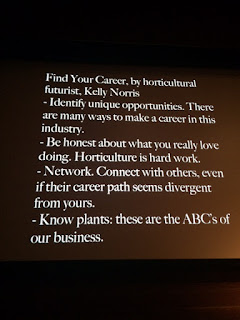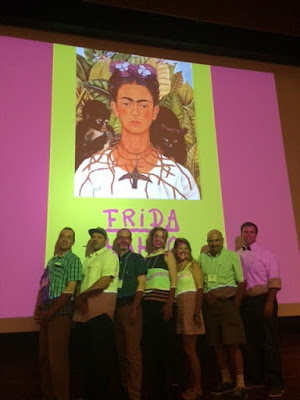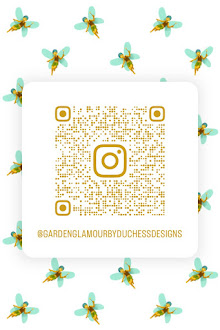 |
Charles Yurgalevitch, Director, NYBG School of Professional Horticulture, welcomes all to
Green Industry Intern Field Day III |
The day was already a seasonal gift by the time Metro North’s doors glided open at The New York Botanical Garden (NYBG). Ribbons of New York City-area Horticulture interns - or “Green Industry” interns - as the moniker has been rebooted -- were streaming into the Garden, along with plant, food, and culture enthusiasts keen to experience the Frida Kahlo exhibit and the Wednesday Greenmarket hosted by NYBG.
I too bristled with excitement
. There is the unmitigated pride that goes along with being a part of - and a huge supporter of The New York Botanical Garden Hosts 'Hortie Hoopla .../Green Industry Field Day. I’ve contributed, attended, and reported on all three Hortie Hoopla events, I’m happy to say. Plus this year, I have the distinct point of honor to see “my” School of Professional Horticulture (SoPH) students as role models and guides for the Green Industry intern guests. See, I’ve had the privilege to teach the SoPH students the last two semesters. They are incredible. The future of Horticulture is unmistakably ascendent with these dedicated students at the helm of a new Horticulture. They recognize it’s a plant-centric world confounded with climate change and yet at the same time, see a renewed dedication to protecting and invigorating our environment, stewardship, and sustainability. Make no mistake, they hold the keys to our future. And that they hail from around the globe and come to NYBG for the best in horticulture education and hands-on training only amplifies the “green” gravitas.
Proof that the adage, “Knowledge is Power” resonates - this year’s Green Industry interns and the SoPH students were ready to soak up all the information and experience of the day. After all, they are be poised to lead the world.
But then, that’s my love letter to the students every week…
The weather for Green Industry Field Day the last two years was oppressive. While we horticulturists and gardeners are a hearty lot - touring the NYBG gardens to bask in their beauty and participate in the Hoopla’s Plant ID “contest” which is a kind of “Huckle-Buckle-Beanstalk” meets brain game - the humidity and high heat, needless to say, rendered most to a weaker point. Not so, this year! Everything was garden nirvana.
The morning’s feature talks were superlative.
Charles Yurgalevitch, NYBG’s Director, School of Professional Horticulture, and the acknowledged “maestro” behind this respected, professional educational and networking event, welcomed the attendees and reviewed the elements of the power-packed day.
Up first was Todd Forrest, NYBG’s Arthur Ross Vice President for Horticulture and Living Collections. Forrest - (don’t get started on the name/career affiliation thing! Todd was even the lead on the Garden’s old-growth 50+ acre forest earlier in his NYBG career) and kicked off the day with just the right mix of his own career experience and green industry internships.
Forrest noted that if “endless learning” is top-of-mind appealing or attractive in a job - then there is no better choice than horticulture. Forrest added that learning practical, helpful information that can be shared is what he loves about being in Public Horticulture. “It’s an awesome thing to me -- working in public hort for 25 years; 18 here at NYBG.”
He added, “There’s a perspective on the value of public horticulture in a changing world.”
He joked to interns - thanking them for “taking vow of poverty” in pursuing their chosen field and profession.
I didn’t laugh too much… We must change this. Professional Horticulturists do real, valuable, honored work. Top-tier landscape architects make outstanding money so why shouldn’t more elements of professional horticulture pay as good as other important, significant, and artful careers? More on this subject in another post.
What do you think?
Forrest concluded by saluting the interns and students saying, “Good for you. You get to work your butts off in a variety of battled circumstances, including, pests and weather.”
Charles noted every NYC borough was represented, as well as upstate, Long Island, Pennsylvania, and the Garden State. He said, “The common denominator is our love of working with plants.” Charles described the day’s high standard of horticulture, garden visits, and career information. He also thanked the sponsors, as noted in my last post: The 3rd Annual, NYBG NYC-Area, Green Industries Intern … as the day can’t be produced without their generous support.
Featured Speakers
Karen Daubmann - Associate Vice President of Exhibitions and Public Engagement, spoke first. Daubmann described how she and her team produce four to five major exhibitions per year, plus another six. The exhibitions promote visitations, new visitors, and encourage membership. Daubmann described her job menu of writing for the website, for catalogs, and for exhibition copy.
She and her team work four years in advance of a major exhibit. Tantalizing, was her description of how she traveled to Mexico to research the plants and the Kahlo home and museum in order to inform the Frida Kahlo special event now on display throughout NYBG.
Daubmann went on to describe her own intern experiences, including one in Rhode Island doing research, counting taxus roots, and being happy to be outside. She also interned at Walt Disney World building topiaries in the middle of the night. “Disney knew that atmosphere affects visitor experience.” She added she didn’t want to be inside drafting - she wanted to work in public display gardens. She advised the attendees to get and give real-world experience. “See what it takes.“ Daubmann added, “Pay attention to schedules and the work on a daily basis. And talk to each other,” she advised. “Everyone has a different journey in horticulture. Learn where you’ve come from.”
Rebecca McMackin - Director of Horticulture for the award-winning Brooklyn Bridge Park - surprisingly, said she was never an intern. Rebecca went on to describe her eclectic background of school and work experiences - that seriously could be wholeheartedly characterized as a rather, personalized internship, of sorts. She said, “Hort attracts eccentrics. We’re almost all romantics.” No argument here. I believe horticulturists and plant lovers are touched by special angels and nature warriors...
Rebecca said, “Gardening for me was applied science - no statistics -- and I never get bored.” She further cracked up the eager intern and student audience with her recollections of working in Brooklyn and the NYC Parks Department, saying, “Plastic is part of the city’s soil.” Further, as an urban parks hort worker, “‘We had to destroy inappropriate, anatomically-configured snow sculptures, and poo things therein…” Today, she and her rock star- arborist-now-husband whom she met in the park, recently celebrated the birth of their first child. She described her hort-park work as crazy (as crazy as those squirrel people!) but also “sooo rewarding.” She added, “We are people’s last hope for biodiversity and they love you.” Rebecca encouraged the up-and-comers to attend as many lectures as they can, especially those available from Metro Hort Group and the Torrey Botanical Society Takeaway? Rebecca, the cute and energetic hort leader concluded by saying, “Even on the worst days it’s a dream job.”
Heather Liljengren - Supervising Seed Collector/Field Taxonomist, Greenbelt Native Plant Center said she is a lover of seeds. Her dream hort internship was studying tropical plants in Hawaii for three months. There were almost audible smiles in the audience as a kind of demonstrated “hort envy…”
Heather described how she worked with the scientists on the edible taro plants and the endangered plants. She admonished the interns and students to be mindful of what her instructor, Dr. David Bernie, told her: “Do something that matters. Do something that contributes to the natural world.” She shared how the Hawaiian natives descried the “manos” as coming to suck the power of the land and how it informed her. She knew then she wanted “to give back.” And she discovered a way to give back through ethnobotany and research conservation.
Heather said she also knew she needed one year of practical experience. She moved to New York without a job, pointing out that was a big leap of faith. But she knew she wanted to be in Gotham. Despite working a series of rather mundane jobs such as watering plants for an interior-scaping company. “And I had a college degree,” she added with humor. A break came when she got another internship at Brooklyn Botanic Garden. For nine months she worked with the curators, gardeners, and scientists. In a stroke of botanical magic working with the BBG scientists she was able to go the the Pine Barrens.
As an aside, I did this too. It is indeed a revelation and life-changing experience.
While working at the Pine Barrens, Heather met a women collecting seeds.
Heather had her “aha” moment.
She asked this woman - who it turns out, was working for the Greenbelt Native Plant Seed Saving initiative about her job. Heather looked at her with a sense of wonderment.
She asked, “Can I follow you for a ‘Day in the Life’ kind of experience?” Of course.
Heather concluded by saying, “Be a force in the natural world. Be more connected to the landscape. This is an exciting and growing industry. Find your niche!”
Jason Sheets - Brooklyn/Queens Regional Director, New York Restoration Project NYRP said he started his horticultural career “In a pile of trash.”
That got the audience’s attention.
Jason went on to say he really started his love of plants in Guatemala - at a women’s cooperative, cultivating herbs and medicinal plants in a deep jungle. Jason described how he contracted dengue fever there yet was cured by the locals using native leaves that he drank and that were placed on his chest.
After his healing and recovery, Jason said he returned in good health - back to “the concrete jungle.”
He acknowledged “dating himself” saying he found his first job via the Village Voice. This job posting led to his work with the New York Restoration Project - the effective, happy, Bette Midler-founded organization. And it must be pointed out - the NYRP is the only organization Mayor Rudy Giuliani backed away from! He says he got the Mafia, longshoreman, but not the gardeners…
Jason described how he started working in High Bridge in the Inwood section of Washington Heights. “There was no maintenance there for 25 years,” he said.
The situation such as it was sounded indeed bleak: trash, stripped cars, diapers... There were also “red neck pheasants and vomit.” What a landscape.
Jason’s observations fueled his desire for horticulture. Further, he zoned in on restoration work -- unearthing walkways and pathways - doing ecological restoration work.
Jason knew he’d be connected to the earth and wanted to be in an urban environment. After all, he grew up in New York City. After NYRP acquired 51 parks and subsequently became an LLC working in a private/public partnership, the organization called him back to create field operations. He soon found himself in small parks building communities of volunteers who want to be involved in their neighborhoods. He said he learned on the job by working with landscape architects, gardeners, attending the plethora of hort lectures available to New Yorkers, as well as doing his own esearch. He still enjoys working outdoors and having the ability to touch other people's’ lives. He said, “I’ve been blessed - I have a great work - in a great city. And I’m always learning. Do what you want to do. Follow what you want to do.” Jason added, “Watch the plants - visit botanic gardens - follow the four seasons.”
Tom Smaar - the soon-to-be-departed Director of Horticulture at the almost too-popular High Line said “There is a revolution going on now in horticulture that is very exciting.”
Given his impressive horticultural pedigree, it was somewhat of a surprise to hear him say he started out not liking plants. He grew up an “Army brat,” living with his family in Hawaii, Georgia (world-class plant places) but he didn’t pay attention to plants. “Things started clicking in high school in Pennsylvania,” he said. He had a pet dog and woods there. Seems natural then that he started learning plants at that time; in that place.
“My first Latin word was “hepatica,” he recalled. In school, he pursued environmental studies. His first internship was a kind of cautionary tale. According to Tom, his first application was a non-starter. “They rejected me,” he joked. But another candidate dropped out and well, one thing led to another and ultimately - to that internship - at no less than the revered Longwood Gardens. And he got hired as an employee. Tom advised, “Take advantage of the internship - - get into it - ask about it.”
Tom highlighted his work experience in Seattle, as an estate manager, and at the Rose Kennedy Greenway in Boston. In both green worlds, he was rather thrust into situations, er, opportunities -- where he had to hire teams, manage budgets - such as they were. For the benefit of the horticulture students and interns in attendance, he pointed out that the relationship to plants is, of course, important, but in public gardens especially, it’s the relationship to people too. And he very much likes that. “People enjoy a park - or the botanic garden - they’re in the moment,” he noted. He added, “Horticulture is amazing - there are sooo many things you can do. We impact people’s lives.” Tom advised the hort students and interns to “Seek their dreams.”
Charles then introduced Ken Druse (About Ken:) naturalist, award-winning garden writer, author of more than 20 books, photographer, and host of the weekly radio program, Ken Druse REAL DIRT. Ken’s latest book The Natural Shade Garden: Ken Druse: 9780517580172 is a robust - hands-on, information-packed tome, and probably his most important contribution to the next generation of horticulturists, especially Ken’s emphasis on “climate change.”
Ken possesses an inimitable speaking style. He is a world-class garden leader and lecturer. And he has an enviable skill for targeting his audience. Here, at the Green Industry Intern/Hortie Hoopla, he blended a potent combination of stimulating experience, academic information, humor, and yes, his admitted cynicism.
“Recognize the value of good horticulture,” Ken proclaimed.
He launched his presentation with the query, “What is a garden?” Via funny, yet all-too-real advertising, YouTube Videos, and on-site/in-situ images, Ken showed how the business and world of horticulture has a public relations problem. From the commercial for powerful jet - blowers that screech and blow relentlessly in suburbia to the proliferation of the curious mulch “volcanos” punctuating the landscapes.
Ken also decried the HGTV view that a “garden gets done.” (Us garden lovers are in on the joke here. See, a garden is never truly “done.” Rather it evolves. Besides, in proper English - only food gets “done.”)
Ken admonished the interns to think “It’s a garden ‘task’ vs. ‘work.’ It’s not a chore!” Then there were the images from the big box stores that cluster garden plants with the chemicals and poisons that eradicate the pollinators or anything that’s crawling, flying, or otherwise not invited to the landscape and garden.
“They promote a garden like it’s Christmas lights,” Ken bemoaned while referring to the garden plants’ resident SKU’s now sharing real estate with other “home decor.” Yikes. If one needed any more proof that the age of the Collector is over, look no more.
Ken went on to showcase the romanticism and passion for building plant collections. He told a probably as-yet uninitiated audience about the process avid plant lovers went through to acquire rare and new plants - so that the audience could see horticulture through the optics of the plant kingdom’s proud and esteemed history. There is/was excitement and reverence for the plants. He described, for example, how a collector had to get the new Hosta. And people would clamor to visit collections in order to see and witness the plants. “Would people buy ‘weird’ plants, today?” Ken pondered… Then, sadly, answered his own question, showing Heronswood Nursery that was considered one of the world’s finest nurseries offering rare and unusual plant varieties, that was originally established by the naturalist, Daniel J. Hinkley. It was sold to Burpee then somewhat promptly, closed. A Horticulture loss and a real tragedy -- and not just for plant lovers…
Ken also showed Brooklyn Botanic Garden’s (BBG) new visitor center, commenting that he’s not sure about this as a gateway to bringing those visitors into the garden to engage with the plants. He thinks it might just set up a scenario or situation where visitors will view the video orientation and leave it at that. Not go out into the garden, comfortable with the fact that they’ve seen the best of what the garden has to offer...
He does admire the strategy of the High Line - whereby the design encourages visitors with a way to get close - “to stop and notice - engage and encounter the plants.”
Ken continued, pointing out another changing business element of horticulture that the audience needs to consider. Independent nurseries, along with plant collectors, are disappearing. (I was thinking this is not unlike independent book stores.) He showed a Kia dealership where his local nursery used to be. But rather than fret their loss he explained what nurseries should be. Bring in the excitement of plants, unique plants, and plants that tell a story.
Then Ken focused on that pesky, An Inconvenient Truth: Climate Change. He showed residences in California. That the once “Golden State” is rendered to almost biblical disasters is so incredibly heartbreaking. There is the saying, “As California goes, so goes the nation.” But please, dear Mother Nature, not in this case…
Ken pointed out the need to limit fuel around the house if one lives in forest fire prone areas. Plant succulents not roses. (Think, “right plant/right place.) He showed the queen of designing with these drought-tolerant beauties, our friend, Debra Lee Baldwin. And not two days before, I was telling my friend, Joni and her son Kyle who were in Gotham from Los Angeles to “ditch the lawn and design with agaves and succulents! Ken noted the great loss of land in LA with approximately one football field’s worth every hour. “They drain the wetlands and build casinos. They could restore the wetlands - but it would cost something like $13 billion.” He added “...That was about equal to two weeks spending on the war in Iraq.” Further, closer to home, he advised we need to make wetland buffers in the New York, tri-state area. Ominously, he said, “Superstorm Sandy can happen again.”
 |
| Solid career advise from Ken Druse to next generation of Hort Professionals at Hortie Hoopla III |
Ken concluded by pointing out the increasing plethora of jobs available in horticulture, showing page after page of opportunities; providing a list of recommendations. From Metro Hort Group to Emergent, The Facebook social media connection for Young Nursery Professionals
The Keynote Speaker was the irrepressible Jared Barnes, Ph.D, Assistant Professor of Horticulture, S.F. Austin State University.
His exuberant talk was titled “Keep Growing! An Abbreviated Anatomy of Cultivating Yourself and the Craft of Horticulture.”
The first image was Jared at five years old - in the garden with his grandfather - tending and clearly enjoying their homegrown corn & tomatoes. Jared’s horticulture career was clearly an early launch. He was a Master Gardener at 15-years old and a featured profile in Ken Druse’s seminal series in “Organic Gardening:” Next Generation 2.0 and in large part, the foundation or basis for the Green Industry Field Day.
Jared challenged the attendees to talk among themselves and come up with an answer to “What are three ways plants inspires us?” In 45 seconds. Some of the answers: “Plants are beautiful. Sexy. NYC street trees. Plants are like children.” All great replies.
Plants teach us about relationships, Jared pointed out.
Look at 10 ways plants can inspire us. The conceit of the presentation was how Jared linked the plant behavior with human expression.
Terraform - Plants can change the environment they are growing in. For example Pioneer Plants create change. Legumes change the soil. So too grad and undergrad students at NC State. He brought them together -- and in the process, transformed the work environment.
Bloom in the shadows - He showed heartstopping whitewater falls in NC and nearby - in the dense shade things can grow. There are trilliums by the thousands. “We have to get down on our hands and knees to see, they are so small. But there is no ‘Imposter Syndrome’ - or self doubt.” He admonished the audience not to harbor self doubt or a sense of failure or wallow in the shadows. “Do you think the trilliums are saying that? No! Find a niche and do it well. One day - you’ll be one of the giants.”
Produce rings - He showed a tree’s primary and secondary growth each year. Likewise, he suggested the interns and students be observant and record their thoughts and images. “Take note - keep a journal of ideas, quotes, inspiration. Whether on paper” - he showed his journal - “Or digital i.e. “Evernote or Trello App or on smartphone -- you can capture ideas,” Jared said. “Gardening needs journaling - keep track.”
Failure becomes Compost - In nature, a discarded something becomes something better. Nature is forever changing. So too, our failures shouldn’t inhibit us. We can learn from them. Do better.
Explore the earth - pretty much what plants do even if they are mostly sedentary. He showed a strangler fig image - where the plant still manages to explore the earth. He congratulated the audience for being at the Garden for the event - learning and exploring and encouraged them to get the most out of their internships.
Make secondary products - plants are extraordinary at doing this. They have lipids, sugars, etc. to aid in their survival and growth. His example was the leaves changing color in the autumn. We humans need to engage in primary and secondary pursuits or hobbies, including cooking, drinking, sports.
Embrace Dormancy - Plants in temperate and tropics experience this. “We humans don’t embrace dormancy enough” He encouraged the audience to sleep and take vacations.
Be a Symbiant and not a parasite. Jared’s hort eg is the symbiosis of the pea plant and nodules in the soil -- mutually beneficial. For humans, he said, think how we can connect and help our environment -- where we work and live and.. Think how you can invest in your network - help others. Don’t sap energy off other people. Don’t use social media to just “Like” Facebook posts. Form friendships - connect with others and help others in horticulture.
Propagate - John Bartram and William “discovered” the Tree of the Month - Franklinia or Franklin Tree (Franklinia … in 1765 Franklinia but was never seen again in the wild. We have Franklinia today because they reached out and preserved it. He said we need to think about how we can reach out and preserve. Sow enthusiasm. Perpetuate clones. Graft interests. We need to teach kids about plants, too.
Keep Growing - Plants keep developing; blooming. People too. Keep thinking how to grow - via lectures, books. Ultimately - show initiative.
 |
| Speakers: (L-R) Yurgalevitch, Sheets, Smaar, McMackin, Liljengren, Daubmann, Druse, Barnes |
Following a catered lunch accompanied by career talks and conversations,
the interns were grouped and escorted for their tours of the New York Botanical Garden. Evening afforded them the opportunity to network amid the charm and beauty of NYBG’s
Ruth Rea Howell Family Garden and enjoy bbq supper, Bronx Beer, and a very special day of Green memories and education.


















